-
Seedshop
-
Feminized
Cannabis seeds -
Autoflowering
Cannabis Seeds -
Regular
Cannabis Seeds -
F1 Hybrid
Cannabis Seeds -
CBD
Cannabis Seeds -
Zamnesia
Cannabis Seeds
-
Top 10’s
- Top 10 Feminized Seeds
- Top 10 Autoflowering Seeds
- Top 10 Regular Seeds
- Top 10 USA Cannabis Strains
-
Favourites
- Beginner Strains
- Below 1% THC
- Classic Cannabis Strains
- Cup Winners
- F1 Hybrids
- Fast Flowering Seeds
- High CBD Strains
- High THC Strains
- Mix Packs
- Zamnesia Exclusive Collabs
-
-
Headshop
-
Vaporshop
- Spare Parts & Accessories
- AirVape XS GO (2021)
- Arizer Air MAX
- Arizer Extreme Q
- Arizer Solo 2
- Arizer V-Tower
- Arizer XQ2
- Boundless CFC 2.0 Vaporizer
- Boundless CFX
- Boundless TERA (V3)
- CRAFTY+
- DaVinci IQC
- Dr. Dabber Boost EVO
- DynaVap VapCap "M" PLUS 2023
- DynaVap VonG (i) Titanium
- Flowermate Aura
- Flowermate Cap Pro
- Flowermate Slick
- Flowermate V5.0S Pro
-
Healthshop
-
Smartshop
-
Shroomshop
-
Growshop
-
Seedshop
All CategoriesSeedshop
- Autoflower Seeds
- Feminized Cannabis Seeds
- Zamnesia Seeds
- Zamnesia's Top 10
- CBD Seeds
- F1 Hybrids
- Seed Banks
- Mix Packs
-
Popular Strain Types
- Zamnesia Exclusive Collabs
- Classic Cannabis Strains
- Amnesia Seeds
- Haze Seeds
- Skunk Seeds
- Kush Seeds
- Purple Seeds
- Blueberry Seeds
- Cheese Seeds
- Diesel Seeds
- White Widow Seeds
- Gorilla Seeds
- Northern Lights Seeds
- Granddaddy Purple Seeds
- OG Kush Seeds
- Blue Dream Seeds
- Lemon Haze Seeds
- Bruce Banner Seeds
- Gelato Seeds
- Sour Diesel Seeds
- Jack Herer Seeds
- Girl Scout Cookies Seeds (GSC)
- Wedding Cake Seeds
- Zkittlez Seeds
- Pineapple Express Seeds
- Chemdawg Seeds
- Hindu Kush Seeds
- Mimosa Seeds
- F1 Hybrids
- Mix Packs
- Cup Winners
- Beginner Strains
- High THC Strains
- Fast Flowering Seeds
- Regular Cannabis Seeds
- USA Cannabis Strains
- Cup Winners
- Seedfinder
-
Vaporshop
All CategoriesVaporshop
- Top 10 Vaporizers
- Spare Parts & Accessories
- AirVape XS GO (2021)
- Arizer Air MAX
- Arizer Extreme Q
- Arizer Solo 2
- Arizer V-Tower
- Arizer XQ2
- Boundless CFC 2.0 Vaporizer
- Boundless CFX
- Boundless TERA (V3)
- CRAFTY+
- DaVinci IQC
- Dr. Dabber Boost EVO
- DynaVap VapCap "M" PLUS 2023
- DynaVap VonG (i) Titanium
- Flowermate Aura
- Flowermate Cap Pro
- Flowermate Slick
- Flowermate V5.0S Pro
- G Pen Elite II
- G Pen Micro+
- G Pen Roam
- Hyer Big-E Rig
- MIGHTY+
- PAX Mini
- PAX Plus
- PLENTY
- Puffco Peak Smart Rig
- Puffco Plus
- Storm Vaporizer
- The Proxy (Puffco)
- VOLCANO CLASSIC
- VOLCANO HYBRID
- Vapman 2.0
- Vapman Click
-
Smartshop
All CategoriesSmartshop
- Top 10 Smartshop
- Zamnesia Gift Cards
- After Party
- Aphrodisiacs
- Aromatherapy
- Blue Lotus
- CBD Vape Juice
- Capsule Machines
- Crystals, Gemstones & Minerals
- Dream Herbs
- Drug Tests
- Extracts
- Happy Caps
- Herbal Tea
- Herbs & Seeds
- Incense
- Kanna
- Kratom
- LSA Seeds
- Mescaline Cacti
- Microdosing
- Nootropics
- Relaxing
- Salvia divinorum
- Smart Seeds
- Stimulants
- Supplements
- Tinctures
- Vape Herbs
-
TRIBE
All CategoriesTRIBE
- My Membership
- Spend Gift Points
- TRIBE Sale
- Exclusive products
- Earn Extra Gift Points
-
TRIBE
- Early Access
- Refer a Friend
- Information
-
TRIBE
-
Language
 United States
United States
Thursday, 08 January and Wednesday, 14 January 2026*
What's The Difference Between Coffeeshops, Headshops, Smartshops, And Dispensaries?

Coffeeshops, headshops, smartshops, dispensaries… You might have read through some of our articles and gotten a little confused by these terms. We take a quick look at the differences between these retailers, and what you can expect upon entering each one.
In some countries, one still has to purchase their weed on the streets or through somewhat shady backchannels,. That is, if one actually has the nerve and/or desire to go against the law. This is highly unfortunate for cannabis afficionados living in or visiting these places. Luckily, there are increasingly more countries in the world that are taking a more liberal approach to cannabis use and the trade thereof.
The type of "weed dealership" you will be visiting is highly depandant on the country you are in. Flower, be it for medical or recrational use, and in some places even concentrates, are sold in different types of shops, all with their own rules of engagement.
COFFEESHOPS: DUTCH STORES THAT SELL CANNABIS
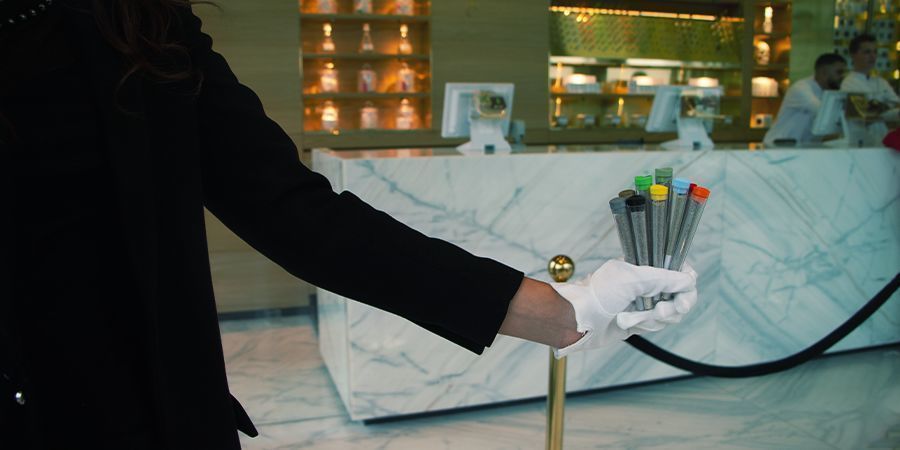
Coffeeshops are a Dutch invention, and one of the biggest tourist attractions in the Netherlands. In the 1970s, the Dutch government decided to change its stance on drugs, somewhat decriminalising cannabis as a result. This eventually gave birth to the now internationally recognised Dutch coffeeshop scene.
Coffeeshops vary greatly in their atmosphere, prices, and the quality of the weed they sell. Most of the coffeeshops in Amsterdam are located in the Red Light District and cater mainly to tourists. However, there are other, less-touristy coffeeshops hidden throughout the city too.
Most coffeeshops will stock a selection of cannabis flower, extracts, and even some edibles. These shops are licensed by the government and come with a number of restrictions. For example, according to Dutch coffeeshop law, a shop can only sell a maximum of 5g of cannabis twice a day to the same person. They also can’t sell cigarettes or alcohol.
HEADSHOPS AND SMARTSHOPS: FROM BRICK AND MORTAR TO E-COMMERCE
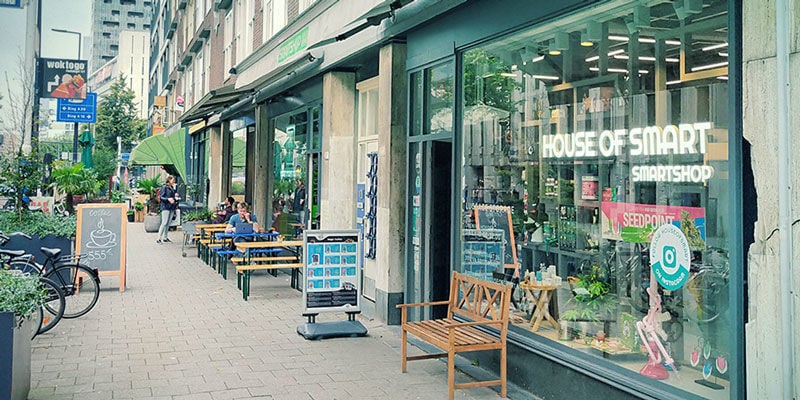
Headshops can still be found in many countries around the world. They usually stock bongs, pipes, papers, grinders, and other kinds of paraphernalia and equipment related to cannabis. In the US, headshops started to pop up around the country during the 1960s hippie movement, and many had ties to socio-political movements (Davis, 2017) against the prohibition of drugs, the Vietnam War, and more.
Smartshops, on the other hand, are newer, and are usually dedicated to the sale of psychoactive substances and related products. They are very popular in the Netherlands, where they can legally sell psychoactive truffles and cacti. However, smartshops also exist in Sweden, the UK, the Republic of Ireland, and Portugal, which has a very liberal stance on drugs.
Today, brick and mortar head/smartshops are largely being replaced by online retailers.
DISPENSARIES: THE AMERICAN WAY
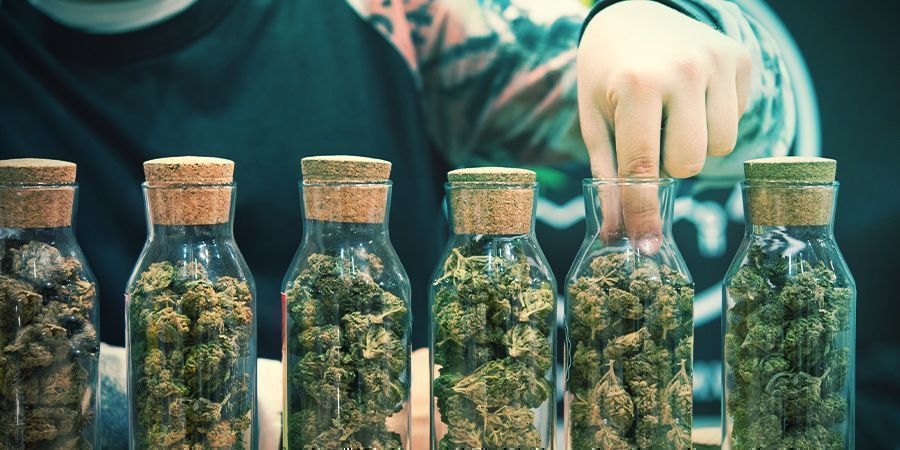
Dispensaries are pretty much exclusive to the US, although a few cannabis retailers in Canada also label themselves as dispensaries. In the US, dispensaries are regulated by the local government, and, according to local law, can sell set amounts of cannabis products.
Dispensaries can either sell cannabis for adult use (in states with recreational/adult-use laws) or medical use. In the case of the latter, cannabis can only be sold to those who either have a medical prescription or are registered as medical marijuana patients.
US dispensaries carry a variety of different cannabis products, including extracts, tinctures, vape cartridges, edibles, and, of course, a large variety of dried flower. In some states, dispensaries even sell clones and plants. The amount of cannabis a dispensary can legally sell in a single transaction varies from one state to another.
COLLECTIVES: NON-PROFIT ORGANISATIONS

Cannabis collectives differ from dispensaries in that they are usually non-profit organisations. Like collectives in other industries, these consist of a group of people working towards a common goal—namely, providing cannabis to medical marijuana patients or adult-use buyers.
Cannabis collectives will usually stock the same kinds of products as dispensaries. However, some collectives may only sell cannabis to its members or patients registered with the collective. However, this depends on the local laws where the collective is operating.
CANNABIS CLUBS: THE SOLUTION TO ADULT USE IN SPAIN AND URUGUAY

Cannabis clubs are very popular in Uruguay and Spain. These clubs are usually non-profit organisations that are registered to produce cannabis for their members.
In Spain, new members can only join a club upon recommendation from another member. In general, members can only buy up to around 3g of cannabis per day in order to prevent re-selling.
In Uruguay, registered clubs can produce a set amount of cannabis per member per month. These members will usually pay a monthly membership fee, and the clubs are registered as private non-profits.

- Joshua Clark Davis. (n.d.). From Head Shops to Whole Foods | Columbia University Press - https://cup.columbia.edu
- France
- Germany
- International
- Italy
- Netherlands
- Polska
- Portugal
- Spain
- United Kingdom
- United States
You might also like
-

 9 min
18 July 2025
Top 15 Coffeeshops In Amsterdam
Whether you're a regular visitor to the great city of Amsterdam or planning your first-ever sojourn to this Dutch wonderland, one thing is for sure: you'll want to sample some of the best coffeeshops ...
9 min
18 July 2025
Top 15 Coffeeshops In Amsterdam
Whether you're a regular visitor to the great city of Amsterdam or planning your first-ever sojourn to this Dutch wonderland, one thing is for sure: you'll want to sample some of the best coffeeshops ...
-
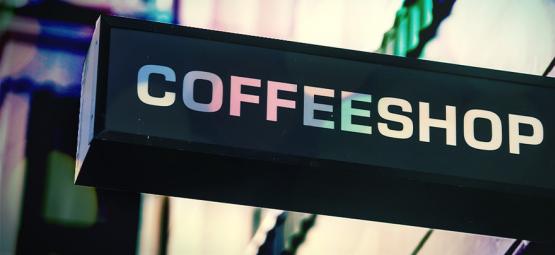
 5 min
25 December 2019
Best Dutch Coffeeshops In Cross-Border Regions
Buying weed in Amsterdam is simple, but other cities have different rules. Some regions only serve cannabis to Dutch citizens. If you're heading in from across the border, check out these coffeeshops ...
5 min
25 December 2019
Best Dutch Coffeeshops In Cross-Border Regions
Buying weed in Amsterdam is simple, but other cities have different rules. Some regions only serve cannabis to Dutch citizens. If you're heading in from across the border, check out these coffeeshops ...
-
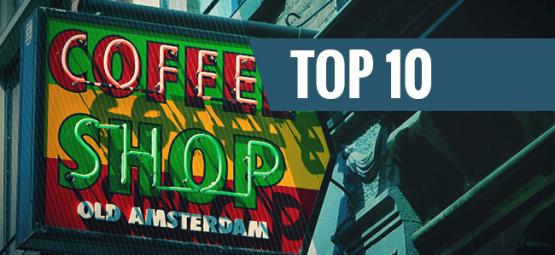
 3 min
9 August 2018
Amsterdam Coffeeshops: Top 10 Tips For First Timers
When planning your first trip to Amsterdam - the city of cannabis - it‘s good to know a few things about what to expect and how to get the most out of your coffeeshop experience. Be sure to check ou ...
3 min
9 August 2018
Amsterdam Coffeeshops: Top 10 Tips For First Timers
When planning your first trip to Amsterdam - the city of cannabis - it‘s good to know a few things about what to expect and how to get the most out of your coffeeshop experience. Be sure to check ou ...
-
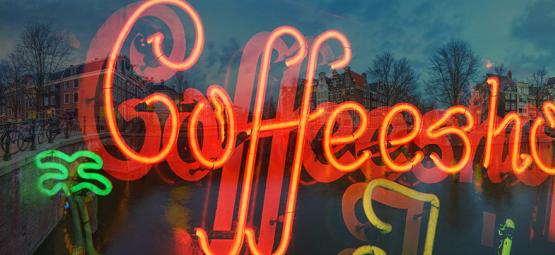
 3 min
16 May 2018
Zamnesia's Amsterdam Coffeeshop Visits
Tag along with the Zamnesia team on their Amsterdam coffeeshop tour, and discover ten coffeeshops that are not to be missed when visiting this beautiful Dutch capital. ...
3 min
16 May 2018
Zamnesia's Amsterdam Coffeeshop Visits
Tag along with the Zamnesia team on their Amsterdam coffeeshop tour, and discover ten coffeeshops that are not to be missed when visiting this beautiful Dutch capital. ...
Categories
-
Seedshop
- Feminized Cannabis Seeds
- Autoflower Seeds
- Regular Cannabis Seeds
- F1 Hybrids
- CBD Seeds
- Zamnesia Seeds
- Top 10 Autoflowering Seeds
- Top 10 Regular Seeds
- Top 10 USA Cannabis Strains
- Top 10 Feminized Seeds
- Beginner Strains
- Below 1% THC
- Classic Cannabis Strains
- Cup Winners
- F1 Hybrids
- Fast Flowering Seeds
- High CBD Strains
- High THC Strains
- Mix Packs
- Zamnesia Exclusive Collabs
- Amnesia Seeds
- Blueberry Seeds
- Cheese Seeds
- Diesel Seeds
- Gorilla Seeds
- Haze Seeds
- Kush Seeds
- Purple Seeds
- Skunk Seeds
- White Widow Seeds
- Northern Lights Seeds
- Granddaddy Purple Seeds
- OG Kush Seeds
- Blue Dream Seeds
- Lemon Haze Seeds
- Bruce Banner Seeds
- Gelato Seeds
- Sour Diesel Seeds
- Jack Herer Seeds
- Girl Scout Cookies Seeds (GSC)
- Wedding Cake Seeds
- Zkittlez Seeds
- Pineapple Express Seeds
- Chemdawg Seeds
- Hindu Kush Seeds
- Mimosa Seeds
- Zamnesia Seeds
- ACE Seeds
- Advanced Seeds
- Afghan Seed Connection
- Amsterdam Genetics
- Anesia Seeds
- Auto Seeds
- Barney's Farm
- Big Buddha Seeds
- Blimburn Seeds
- Bomb Seeds
- BSB Genetics
- BSF Seeds
- Buddha Seeds
- The Cali Connection Seeds
- CBD Seeds
- Compound Genetics
- Cookies Seed Bank
- Delicious Seeds
- DNA Genetics
- Doctor's Choice
- Dr. Underground
- Dutch Passion
- Elite Seeds
- Eva Seeds
- Exotic Seed
- Expert Seeds
- FastBuds
- Female Seeds
- French Touch Seeds
- Garden of Green
- GeneSeeds
- Genehtik Seeds
- G13 Labs
- Grass-O-Matic
- Greenhouse Seeds
- Growers Choice
- Humboldt Seed Company
- Humboldt Seed Organization
- Kalashnikov Seeds
- Kannabia
- The Kush Brothers
- Light Buds
- Little Chief Collabs
- Medical Seeds
- Ministry of Cannabis
- Mr. Nice
- Nirvana Seeds
- Original Sensible
- Paradise Seeds
- Perfect Tree
- Pheno Finder
- Philosopher Seeds
- Positronics Seeds
- Purple City Genetics
- Pyramid Seeds
- Rare Dankness
- Reggae Seeds
- Resin Seeds
- Ripper Seeds
- Royal Queen Seeds
- Sagarmatha Seeds
- Samsara Seeds
- Seedstockers
- Sensation Seeds
- Sensi Seeds
- Serious Seeds
- Silent Seeds
- Solfire Gardens
- Soma Seeds
- Spliff Seeds
- Strain Hunters
- Sumo Seeds
- Super Sativa Seed Club
- Super Strains
- Sweet Seeds
- TICAL
- T.H. Seeds
- Top Tao Seeds
- Vision Seeds
- VIP Seeds
- White Label
- World Of Seeds
- Seed Banks
-
Headshop
-
Vaporshop
-
Healthshop
-
Smartshop
- Top 10 Smartshop
- Kratom Dosage Calculator
- Zamnesia Gift Cards
- After Party
- Aphrodisiacs
- Aromatherapy
- Blue Lotus
- CBD Vape Juice
- Capsule Machines
- Crystals, Gemstones & Minerals
- Dream Herbs
- Drug Tests
- Extracts
- Happy Caps
- Herbal Tea
- Herbs & Seeds
- Incense
- Kanna
- Kratom
- LSA Seeds
- Mescaline Cacti
- Microdosing
- Nootropics
- Relaxing
- Salvia divinorum
- Smart Seeds
- Stimulants
- Supplements
- Tinctures
- Vape Herbs
-
Shroomshop
-
Growshop
- Top 10 Growshop
- Top 10 Plant Seeds
- All Seeds
- Cacti
- Chili & Pepper Seeds
- Companion Plants
- Edible Plant Seeds
- Exotic Seeds
- Flower Seeds
- Fruit Seeds
- Herb Seeds
- Interior Plant Seeds
- Microgreens
- Psychoactive Plant Seeds
- Sprouting
- Vegetable Seeds
- Wellness Plant Seeds
- After Harvest
- Climate Control
- Fertilizer
- Grow Tents
- Harvest, Dry & Cure
- LED Grow Lights
- Plant Seeds
- Propagation
-
Merchandise
-
Sale section
Categories
Discover
Help & Info
Tools
Our website won't work without these cookies activated. Therefore functional cookies can't be disabled.
















